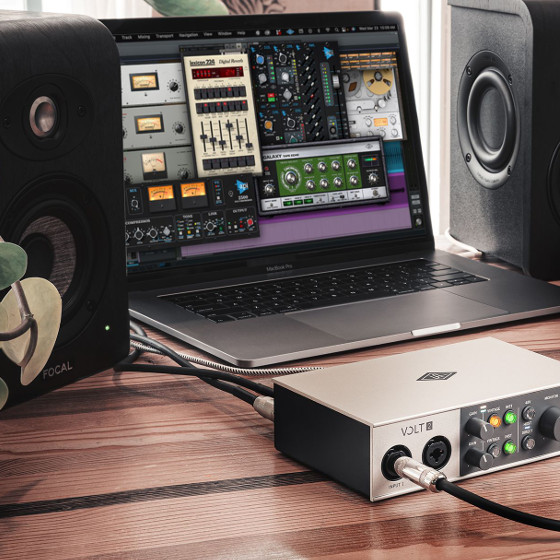Meet Universal Audio’s COO: 10 Questions with Sandeep Gupta
Full circle – that’s the path Sandeep Gupta’s career has taken.
Gupta joined Universal Audio in late 2021 as Chief Operating Officer (COO), coming to the company after a decade at Amazon. He was Vice President and General Manager for Amazon Fire TV while at the online retail + content giant, and he’s held executive positions throughout tech in his 30-year career.
It was formative experiences at Digidesign, as well as Apple where he worked on the game-changing iPod, that made an outsized impression on him. That’s a big reason why he returned to music and sound by joining Universal Audio.
This week, UA introduced the UAD Spark subscription service, which includes UAD plugins including Neve, Moog, API, Lexicon, Teletronix, and UA. Two new Spark-exclusive UAD instruments also debut.
Another recent development is UA’s recent launch of their Volt line of audio interfaces. Gupta’s busy agenda further includes the Apollo range, LUNA recording suite, UAD plugin algorithms, and advanced audio machine learning.
What drives, challenges, and inspires Gupta about audio tools for music producers? Find out in 10 Questions.
Sandeep, you have a distinctive professional background for a pro audio executive. Most recently you were at Amazon for a decade. You also had leadership positions at Yahoo and Apple, as well as Avid/Digidesign. How have these diverse experiences shaped you as an executive?
Each of these experiences shaped me in different ways, depending on where I was in my career. I feel fortunate to have spent eight of my early years at Avid/Digidesign leading the product, UX and technology teams for Pro Tools. Some of the folks I worked with there are now at UA, and it’s great to see these familiar faces.
My formative years there, at Yahoo!, and at Apple leading iPod product software development taught me how to be a leader and how to develop products that deliver value to a large number of users. At Amazon I took on the challenge of building a completely new business with Fire TV, and learned how to consistently engage and attract new customers to the platform.
These experiences really have shaped me to be very customer-focused, and gave me the skills to drive organizations to meet their customer’s expectations.
What convinced you to leave Amazon for Universal Audio? Why is this a natural segue for you?
Amazon was a great experience and I grew in a lot of different ways in my time there, but UA just resonated with me on so many levels.
The pedigree of UA is unrivaled in the audio space. Not only is UA a unique company with a storied history in analog and digital audio, there’s also a vibrant culture with so many skilled people who are dedicated to delivering innovative audio products at the best quality possible, time and time again.
UA is poised to take things to the next level and I knew I could make a difference here, building the business for the future and growing the customer base in different directions. It felt like a natural fit for me. On top of all of this, my son actually is a musician and a huge fan of UA products — that definitely played a part in my decision!
I’m sure that helped! What does the COO of Universal Audio do — what does a typical week look like?
No week is typical — that’s actually what I love about the job. I do a bit of everything — product strategy, working with engineering, collaborating with marketing on customer awareness, interfacing with HR, Finance, the list goes on.
There’s a myriad of tasks that you continue to work through and drive on a daily basis. There’s always new challenges. What I love most is spending my weeks interacting with amazingly smart people on new ways to help our customers.
How would you characterize UA’s place in the audio industry today?
Universal Audio’s roots date all the way back to 1958, where Bill Putnam Sr. — inventor of the modern recording console, the multi-band audio equalizer, and the vocal booth — founded the company. Ever since UA was refounded in 1999 by his two sons, James and Bill Putnam Jr., our mission has been to design high-quality digital recording tools with the sound and spirit of vintage analog technology.
Our Apollo audio interfaces and UAD plugins have played a huge part in the creativity of audio professionals for many years. UA has always stood for the highest quality, professional sound and that continues to be our place in the industry today as we expand our reach to more people than ever before — including guitar players, bedroom producers, and content creators.
On the user side, how do you see UA’s customer base evolving?
Our customer base is intrinsically tied to the way people make music, and we have definitely seen some trends accelerate during the COVID era.
There has been an ongoing shift from musicians working in professional recording studios to creating more often at home, so our customers are more and more often looking for high quality recording tools that are also affordable and flexible. Content creation has also exploded in the last few years with everyone staying closer to home, and that’s a whole new group of people looking for pro-quality audio products that are within reach of what they can afford.
Starting with Subscriptions
UA has just introduced UAD SPARK, a subscription service of UA plugin emulations of hardware and UAD instruments. What made now the right time to roll out SPARK?
Our customers have been asking for a subscription plan and native versions of UAD plugins for quite some time, but for many years, the CPU intensity of our plugin algorithms made that difficult. Our engineers have done some amazing work optimizing our plugins to allow them to run natively, and in conjunction with the increased processing power available on the market today, we’re finally able to offer UAD Plug-Ins and instruments natively via our UAD Spark subscription service.
This evolving collection, which includes the just-released Opal Morphing Synthesizer and Waterfall B3 Organ instruments, is now available to Mac users for $19.99/month with Windows support coming this fall.
We’re very excited for more creators to finally be able to hear for themselves why UAD Plug-Ins are known as the world’s most authentic software emulations of classic studio gear and vintage instruments. It’s another example of our goal to bring our highly-regarded tools to more music makers.
In turn, how are UA’s solutions evolving – how do your current and upcoming products reflect shifts in customer needs and tastes?
It’s very important to us that we meet musicians and all audio content creators wherever they are, and the launch of our Volt series of audio interfaces is a direct response to the evolving customer needs I mentioned above. With Volt, we’ve put UA-quality sound and classic vintage analog tone within the reach of any audio creative — whether recording, streaming, or podcasting.
With the team we’ve built over the last 20 years, we’re in a unique position to bring professional sound to any level of user. Our plan is to continue to bring products to market with this in mind — most of all we believe everyone deserves access to UA-quality sound.
Powering through the Pandemic
How did the pandemic affect UA’s product development teams – what have you learned about remote hardware and software development?
When COVID started, transitioning to remote work was definitely a large concern for us. UA’s culture is very special and there’s a frequent organic exchange of ideas that occur in the office. In the beginning, pivoting to remote development felt challenged. That said, it’s been remarkable to see how quickly our team was able to adapt.
We are always innovating with our products and it turns out that adjusting the way we worked was no different — a cohesive team can work anywhere. We’re taking these lessons to heart as we move forward, allowing people to decide when it’s best for them to work from home or collaborate with others in the office. Both work environments have their advantages. Just like our users, the world and how we work has changed, and at UA we are about embracing change.
Supply chain issues are a major challenge to many audio businesses. How have these issues affected UA, and what do you anticipate moving forward?
Like many other companies, the global chip shortage, as well as shipping and freight issues, have posed large challenges. Luckily, we have a great hardware and operations teams and have been able to pivot quickly to continue to provide a steady stream of products.
These problems are going to continue for a while, so we will continue to stay nimble while maintaining our focus on quality and innovation, and meeting customers’ expectations.
I understand that UA has added almost 100 new staff in the last two years, and that the company is still growing. What is UA looking for in the talent that you hire?
UA is always looking for passionate and talented people from all backgrounds who are focused on making inspiring products for musicians and content creators. It’s the best place in our industry to do that.
We’re just over the hill from Silicon Valley, and the fact that we are able to hire and retain great talent is not an easy feat. It’s always very telling when we celebrate work anniversaries at our quarterly all-hands meetings — many people have been here 10, 15, even 20 years. People have a tendency to stick around once they join the team because of the caliber of people, the strength of our brand, and the quality and attention to detail we put into all of our products.
“We’re Only Just Beginning”
What are the challenges that you see coming up that UA must navigate to continue growing? On the flipside, what are the opportunities that you see ahead?
The general uncertainty in the world would probably top the list of challenges. We touched on global supply chain issues, and frankly who knows what’s next? I’ve always felt that it’s important to face challenges head on and see what opportunities we can unearth regardless of what’s thrown at us.
That said, overall we feel positive about our trajectory. We’ll continue to focus on introducing more and more creators to our forward-thinking audio production tools that have been inspiring sound for generations. We’re only just beginning. It’s weird to say that for a company with UA’s heritage, but that’s the truth.
Bonus question! What are some books, movies, songs, and/or people that you look to for inspiration?
Well first and foremost my kids inspire me all the time with the passion, energy and creativity they bring to everything they do. When it comes to pop culture Batman is my probably the character that resonates with me the most. He’s not a superhero, just a guy trying to do the best with what he has — his mind. Of course the huge bank account doesn’t hurt!
Having grown up in England, I’m also a massive Liverpool football supporter and a big fan of their current coach, Jürgen Klopp. He demands a lot from his team, but at the end of the game he’ll give them one of his famous hugs. He reminds me that you can demand excellence while still creating a positive culture and atmosphere. At the end of the day, that’s my ultimate goal.
— David Weiss is an Editor for SonicScoop.com, and has been covering pro audio developments for over 20 years. He is also the co-author of the music industry’s leading textbook on synch licensing, “Music Supervision, 2nd Edition: The Complete Guide to Selecting Music for Movies, TV, Games & New Media.” Email: david@sonicscoop.com
Please note: When you buy products through links on this page, we may earn an affiliate commission.








